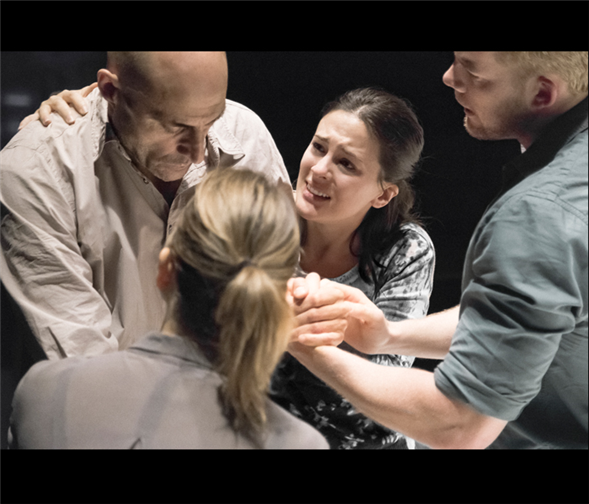Translate Page

Sometimes, a scent defines an entire production
---
Weeks later, I can still smell A View from the Bridge.
Granted, the current revival of Arthur Miller's classic play, which is on Broadway in a production from director Ivo van Hove, left quite a few deep impressions. I was lucky enough to see it from the stage, perched on a seating bank that was practically inside Jan Versweyveld's set. With that kind of proximity, I never had the luxury of developing a comfortable, analytical distance from the show. Sounds, gestures, punches, kisses – they all felt as immediate and unavoidable as a shouting match on a rush-hour subway car. My only option was submitting to the ride.
That's a great way to experience Miller's script, about a Brooklyn dockworker named Eddie Carbone who violently resists the changes that are being thrust upon him by age, the economy, and the undocumented Italians whom he has agreed to keep in his home. One of those men, Rodolpho, falls for Eddie's niece, whom Eddie himself has feelings for, and his sexual jealousy is the final push he needs to reach the play's bruising finale.
Van Hove ups the tragic ante by avoiding any semblance of realism. His actors wear simple clothes and move around barefoot. The set and costumes are all whites, blacks, and grays, and when the rare prop shows up, it's treated like a ritualistic object. Take the scene where Marco (the other Italian living in Eddie's house) proves his strength by lifting a chair. The fact that there is a chair is instantly striking, and as he lifts it, holding it aloft like a statue for what feels like 5 minutes, the thundering score gives cosmic heft to his effort.
And again, sitting near this moment only makes it weightier. That music pounding so close to the ears, that chair hovering so close to the eyes – it's immersive in a way few productions are.
Then there's what happens in the final moment of the show. I won't give away much, but if you know A View From the Bridge, then you know it ends with blood. Van Hove certainly puts blood in his production. and that blood has a smell – one of the most striking odors I've ever encountered in a play. It's sharp and harsh, gathering in the throat like the stench of hospital cleaner, but there's also a sweetness battling with the chemical sting. (This is probably because there are molasses in the stage blood, according to a source involved with the production.) That sweetness, for me, has been especially haunting. It somehow embodies the characters' soiled innocence, or even Eddie's own heartbreaking naïveté about his place in the world.
Being on stage meant getting suffused with that scent, and it felt more intimate than anything else in the show. That's partly, I think, because a smell happens in the body – actual molecules work into the nose – and when it's properly employed, it can make a play feel insistently alive. A smell tells us the world on stage is real enough to get inside our heads, literally.
That's also how I remember the pivotal scene in David Cromer's 2009 revival of Our Town, when Emily travels back in time to visit her 12th birthday. That production's coup de theatre was the sudden arrival of a realistic kitchen set, so that we saw exactly what Emily was re-experiencing. But before the kitchen was revealed, we could smell the actual breakfast cooked by Emily's mother. I remember the scent of eggs and bacon wafting through the theatre before I even knew they were being prepared, and it snapped me to attention. Those wonderful smells were a herald for the moment to come, and they gave me access to my own memories of family breakfasts. Our Town has long been one of my favorite plays, and by adding a scent, Cromer's production made its most shattering scene even more powerful.
Meanwhile, a co-worker of mine returned from the current Broadway revival of Spring Awakening talking about the characters who wander through the aisles swinging thuribles full of incense. It was like the show had taken us to church, she said, even though nothing else changed.
Not that every theatrical smell is transporting. We've probably all caught a whiff of an actor's herbal cigarette and either been distracted or annoyed, and every time fake fog rolls across the stage, we have to brace ourselves for the noxious odor that's close behind it. But a dramaturgically electrifying scent can be the touchstone for an entire production, clinging to our memories like smoke on a sweater.
---
Follow Mark Blankenship at @IAmBlankenship. Follow TDF at @TDFNYC.
Photos by Jan Versweyveld. Top photo, L to R: Mark Strong, Nicola Walker, and Russell Tovey.
Click here to browse our discounted tickets for theatre, dance, and concerts.